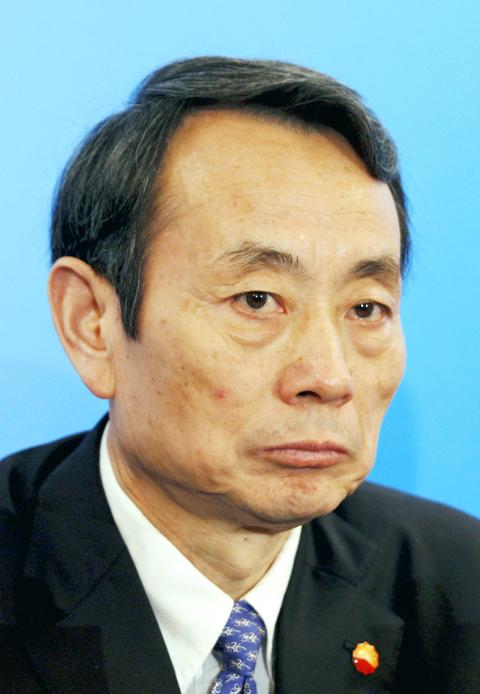Former Chinese state assets chief Jiang Jiemin (蔣潔敏) — one of the highest-profile casualties of the nation’s anti-graft drive and an ally of former Chinese security chief Zhou Yongkang (周永康) — confessed to corruption at his trial yesterday, a court said.
Jiang admitted his offenses at the Hanjiang Intermediate People’s Court in the central province of Hubei, the court said on Sina Weibo.
He is accused of bribery and abuse of power, the court said, adding that Jiang allegedly possessed “a huge amount of assets of unknown origin.”

Photo: Reuters
In a lengthy address, Jiang admitted his guilt and appealed for leniency, the court said.
“The facts of my crime are clear, the evidence is true and undeniable, and the Hanjiang court’s lawsuit is objective,” Jiang said, according to the court statement.
“I confess to the facts of the crime without concealing anything. I admit my guilt and repent for my crimes,” he said, adding that he had “damaged the image of the [Chinese Communist] Party within the hearts of the people.”
“For these errors, I am deeply, deeply repentant,” he said, according to the statement.
The hearing was completed yesterday afternoon and the judges “will select a date to announce the decision after deliberating in accordance with the law,” the court said.
Photographs posted by the court showed a stern-faced Jiang standing in the courtroom, clad in a dark blue jacket and with police officers towering over him on either side.
Chinese courts are closely controlled by the Chinese Communist Party, as is reporting on sensitive trials, and a guilty verdict is effectively a certainty.
Jiang worked for decades in China’s petroleum industry and rose to become chairman of China National Petroleum Corp (CNPC, 中國石油天然氣), the nation’s biggest oil producer.
He has links going back to the 1980s with Zhou, a former CNPC chief himself who went on to become China’s hugely powerful internal security chief, but was charged with bribery and abuse of power this month.
Prosecutors accused Jiang of “seeking profit in exchange for approving projects and granting promotions,” Xinhua news agency reported.
They pointed to 14 instances where Jiang “solicited or illegally accepted money and goods either directly or through his wife,” Xinhua said.
“Prosecutors pointed out that as of Aug. 31, 2013, Jiang Jiemin’s personal and family assets and expenses clearly exceeded his and his family’s lawfully earned income, and Jiang was unable to explain the source of the huge sum accounting for the difference,” Xinhua reported.
Neither Xinhua nor the court immediately provided further details.
Jiang was tapped in March 2013 to run the state-owned Assets Supervision and Administration Commission, which oversees China’s many powerful state-owned enterprises, but less than six months later, an internal Chinese Communist Party watchdog announced that it was probing him for alleged “serious disciplinary violations,” a euphemism for official corruption.
According to state-run media, the move marked the first investigation of a member of the party’s powerful Central Committee, which has about 200 members.

GEARING UP: An invasion would be difficult and would strain China’s forces, but it has conducted large-scale training supporting an invasion scenario, the report said China increased its military pressure on Taiwan last year and took other steps in preparation for a potential invasion, an annual report published by the US Department of Defense on Wednesday showed. “Throughout 2023, Beijing continued to erode longstanding norms in and around Taiwan by employing a range of pressure tactics against Taiwan,” the report said, which is titled “Military and Security Developments Involving the People’s Republic of China (PRC) 2024.” The Chinese People’s Liberation Army (PLA) “is preparing for a contingency to unify Taiwan with the PRC by force, if perceived as necessary by Beijing, while simultaneously deterring, delaying or denying

PEACEFUL RESOLUTION: A statement issued following a meeting between Australia and Britain reiterated support for Taiwan and opposition to change in the Taiwan Strait Canada should support the peaceful resolution of Taiwan’s destiny according to the will of Taiwanese, Canadian lawmakers said in a resolution marking the second anniversary of that nation’s Indo-Pacific strategy on Monday. The Canadian House of Commons committee on Canada-Chinese relations made the comment as part of 34 recommendations for the new edition of the strategy, adding that Ottawa should back Taiwan’s meaningful participation in international organizations. Canada’s Indo-Pacific Strategy, first published in October 2022, emphasized that the region’s security, trade, human rights, democracy and environmental protection would play a crucial role in shaping Canada’s future. The strategy called for Canada to deepen

TECH CONFERENCE: Input from industry and academic experts can contribute to future policymaking across government agencies, President William Lai said Multifunctional service robots could be the next new area in which Taiwan could play a significant role, given its strengths in chip manufacturing and software design, Taiwan Semiconductor Manufacturing Co (TSMC, 台積電) chairman and chief executive C.C. Wei (魏哲家) said yesterday. “In the past two months, our customers shared a lot of their future plans with me. Artificial intelligence [AI] and AI applications were the most talked about subjects in our conversation,” Wei said in a speech at the National Science and Technology Conference in Taipei. TSMC, the world’s biggest contract chipmaker, counts Nvidia Corp, Advanced Micro Devices Inc, Apple Inc and

LEAP FORWARD: The new tanks are ‘decades more advanced than’ the army’s current fleet and would enable it to compete with China’s tanks, a source said A shipment of 38 US-made M1A2T Abrams tanks — part of a military procurement package from the US — arrived at the Port of Taipei early yesterday. The vehicles are the first batch of 108 tanks and other items that then-US president Donald Trump announced for Taiwan in 2019. The Ministry of National Defense at the time allocated NT$40.5 billion (US$1.25 billion) for the purchase. To accommodate the arrival of the tanks, the port suspended the use of all terminals and storage area machinery from 6pm last night until 7am this morning. The tanks are expected to be deployed at the army’s training